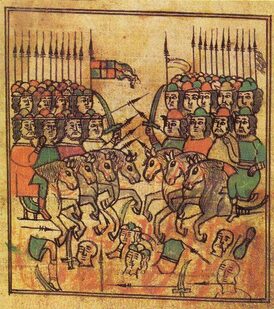and Balkan Europe
by IECOB & AIS Università di Bologna

La “Zadònščina” e il Ciclo di Kulikovo
by: Edgardo Tito Saronne
pp: 204
language: Italian

The main object of this book is to compare two well-known Russian literary epics: the XII
century Slovo o pŭlku Igorevě («The Lay of Igor’s Host») and the XIV century Zadonščina («The Don Tale»). The two texts are similar in form (in many points the two authors use the very same words) and specular in content.
Whereas the hero in Slovo, Prince Igor’ Svjatoslavič, is defeated and captured by his
enemies – the nomadic Polovcy – and as a consequence of his campaign (1185) the Rus’ is plunged into chaos, in Zadonščina, at a place called Kulikovo close to the Don river, in 1380 Moscow’s Grand Duke Dmitrij Ivanovič overcomes Russia’s new powerful enemies – the Mongols or rather the Tatars – who have imposed a heavy yoke in the preceding 160 years. While Igor’s campaign starts under the ill omen of a solar eclipse, Grand Duke Dmitrij (later surnamed «Donskoj») faces a propitious sun when moving east with his army. Igor’s campaign is poorly organized and takes place in almost complete political isolation; Dmitrij, on the contrary, has the help of a powerful coalition, including some Lithuanian princes.
Finally, although both epics were composed in Christian times, Slovo o pŭlku Igorevě has
a prominent pagan inspiration, while Zadonščina is fully immersed in the Christian Orthodox tradition. Slovo was composed at the end of an era when ancient Russia (Rus’) was declining because of internal conflicts and was about to face the threatening Mongol-Tatar invasion; Zadonščina was a celebration of Russian awakening against the oppressor. Where the Slovo sounds ironic against the Russian princes and even towards its hero, Igor’ Svjatoslavič, Zadonščina is flatly encomiastic towards the triumphant Dmitrij Ivanovič «Donskoj».
Poetically, though, Slovo is far above its XIV century imitation. Moreover, Slovo also has the value of a political pamphlet, a denunciation of particular interests preventing military unity against the common enemy, a vigorous appeal to coalition. It also contains an outstanding love theme (Jaroslavna’s lament), interwoven with “magical charm designed to harness the forces of nature” (Kuskov 1980: 125) [1]. On the formal level, the anonymous author of Slovo refuses Boyjan’s [2] high-resounding epical style to adopt the more direct style used in popular epics (the byliny), while Sofonija (Zadonščina’s author) claims to evoke ancient tradition.
The author of the present study, E.T. Saronne, provides (a) a precise comparison
of the two epics; (b) an inedited Italian translation of the Zadonščina and
two other texts pertaining to the so-called Kulikovo Cycle (the Skazanie o
Mamaevom poboišče i.e. «The Tale of the Battle against Mamai» and the Letopisnaja
Povest’ o Kulikovskoj Bitve i.e. «The Chronicle Tale of the Battle of Kulikovo»); (c)
linguistic-philological information and comments on the translated texts; (d) historical
information concerning their main acting characters and their related events.
[1] Vladimir Kuskov, A History of Old Russian Literature , Moscow: Progress Publishers, 1980 (English translation of V. Kuskov, Istorija drevnerusskoj literatury, Moskva: Izd. «Vysßaja ßkola», 1977)
[2] Bojan was a mythical Russian bard of the XI century, who is repeatedly quoted in Slovo.
Table of contents
Introduzione
Il trionfo di Dmitrij Ivanovič
Imitazione e contrasto
Divisione del testo tradotto in sezioni e versetti
Lo Slovo e la Zadonščina a confronto
Parti specifiche dello Slovo e della Zadonščina
Punti di contrasto fra le due composizioni epiche
I contrasti fra lo Slovo e la Zadonščina: riepilogo
Conclusione
Avvertenza per il lettore
Nota informativa
Dati filologici sulla Zadonščina
Elenco delle abbreviazioni
Caratteristiche dei manoscritti tramandati e loro edizioni
Nota sull’accentazione grafica del testo russo
Bibliografia
La Zadonščina e lo Slovo o pulku Igoreve
La “Zadònščina” ovvero Il “Cantare dell’Oltre-Don”
Antichi resoconti storico-leggendari sulla battaglia di Kulikovo
La vittoria dell’Oltre-Don nelle cronache
Lo «Skazanie o Mamaevom poboišče»
Appendice I: Il contesto storico della Zadonščina
Cronologia dei secoli XIII e XIV
Dati storici sui personaggi della Zadonščina
Appendice II: Pronuncia dei caratteri usati nei nomi russi
Download
PECOB: Portal on Central Eastern and Balkan Europe - University of Bologna - 1, S. Giovanni Bosco - Faenza - Italy
Chiudi la versione stampabile della pagina e ritorna al sito.